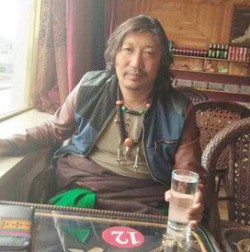A-nya Sengdra, 47, a popular Tibetan activist,has been held in detention since September 4 when he was publicly arrested and beaten up at the roadside. News of the detention is only now emerging because of the lock-down on communications in the area and has been reported by the Tibetan Centre for Human Rights and Democracy (TCHRD) who say that he is being held at the Drotsang County detention centre, Tsoshar Prefecture, where Gade County Public Security Bureau (PBS) officers had taken him.

Photo: TCHRD
TCHRD report that neither his family nor Mr Li Qilei, his lawyer, were initially given permission to visit him despite repeated attempts. On October 22 Li Qilei visited and found Sengda in very poor health having been suffering from severe diarrhea. TCHRD reports that Li Qilei quotes Sengda as saying “I did not commit any crime; I simply appealed to the higher authorities on the well-being of the local people”.
A notice was issued on December 11 informing that Sengda is charged with “picking quarrels and provoking trouble” and that his detention has been extended from November 12 to January 12. TCHRD says they suspect that more charges will be added so he can be imprisoned for a longer period.
On September 8, Sengda’s wife Yangkyi appealed for his release, stating that he had been arrested on baseless charges and is quoted as saying that the arrest is “a reprisal for his activities to defend the rights of local Tibetan nomads”.
Sengdra and ten other nomads founded the voluntary organisation Mand Dhon Ling (Public Affairs Forum) in 2014 with the aim of promoting good governance, anti-corruption and social accountability in their hometown of Kyangche in Amdo. Since then Sengdra has been an active campaigner against corruption and the abuse of power. He was arrested in December 2014 and held for one year and ten months.
According to TCHRD, “provoking trouble” is increasingly used under article 293 of the Chinese Criminal Law to persecute activists defending human rights and criticising government policies. TCHRD has called for Sengdra’s immediate release and for permission for his family to visit him, as well as provision of the medical treatment and care that he needs.




 Print
Print Email
Email